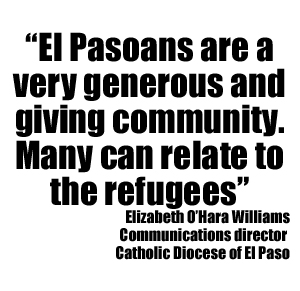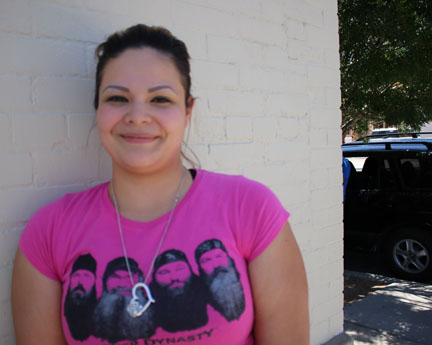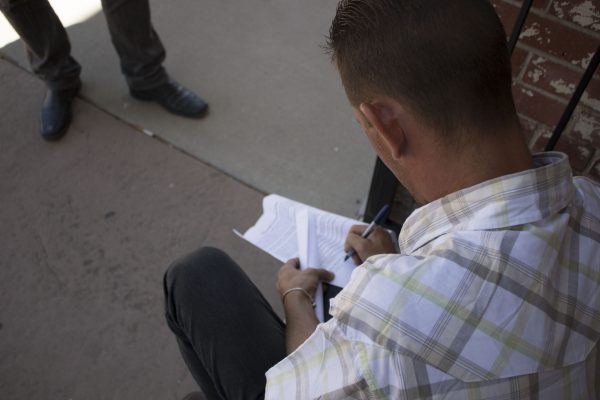Cuban refugees continue to seek asylum in the U.S., traveling from Juarez, Mexico to El Paso for a third straight week, with many staying in El Paso longer than expected, which could strain local organizations that traditionally provide services such as food, shelter and legal advice to immigrants.
Elizabeth O’Hara, communications director of Catholic Diocese of El Paso, said about 300 Cuban migrants have been arriving each day since May 9 for a total of about 3,000 in the last three weeks.
 “Some of them will stay 24-36 hours, but now we’re seeing some of them staying longer,” O’Hara said, adding that the first wave of refugees seemed to be better off financially. “Most of the first ones to arrive had money left so they could bounce out of El Paso faster.”
“Some of them will stay 24-36 hours, but now we’re seeing some of them staying longer,” O’Hara said, adding that the first wave of refugees seemed to be better off financially. “Most of the first ones to arrive had money left so they could bounce out of El Paso faster.”
That seems to be the case as well at the Ysleta Lutheran Mission, which is housing up to 80 refugees at a time. Karla Gonzalez, Ysleta’s chief operating officer, said most immigrants will just pass through El Paso on the way to family or friends in other parts of the country. For some though, coming up with enough money for a bus ticket is daunting.
“We have people here for four days now justing waiting for $60. Without that, they can’t leave,” Gonzalez says.
More than 1,300 Cuban migrants arrived in the U.S. via El Paso in the first quarter of this year according to Roger Maier of U.S. Customs and Border Protection (CBP). That’s up nearly tenfold from the same period last year. El Paso has also eclipsed San Diego as the third most popular entry point for Cuban refugees, following Laredo and Miami.
Although most refugees cited economic hardship and a lack of freedom in Cuba as the reason for coming to El Paso, there is speculation that the 1966 Cuban Adjustment Act may be suspended or terminated now that relations between Cuba and the United States are improving, even though the CBP said the Obama administration said it has no plans to change the current immigration policy toward Cuba. The Cuban Adjustment Act gives Cuban refugees preferential status that includes a Green card one year plus one day after they arrive in the United States.
The CBP has borrowed staff from other locations to help process this spike in Cuban refugees crossing the border at El Paso, but local churches and service organizations have been relying on the community to meet the increased demands for basic services.

Brenda Saenz
One El Paso resident, Brenda Saenz, is hosting Jeorgina Fernandez and and her baby, Pedro in her home. She met them at the Houchen Center and invited them to stay with her as long as they need. “I’m not charging any rent. I am not charging anything,” Saenz said. “They are a blessing in my home, and I want to make them part of my family.”
O’Hara said the El Paso community had only two days notice before the first plane of migrants arrived from Panama and that the community pulled together to make sure no one would be turned away.
“El Pasoans are a very generous and giving community. Many can relate to the refugees,” O’Hara said.
She added that shelters still need monetary donations and pantry items like rice, beans, pasta and bread and personal hygiene items, but no more clothing. “The shelters simply don’t have the room,” O’Hara said.
Refugees Strategize Next Steps
Cuban migrants are a diverse population; they are arriving in families, groups and alone, but all say they want to work.
“I’m planning on staying in El Paso. We cannot work until we have the work permit,” said Arieskis Reyes Perez in Spanish outside the Diocesan Migrant and Refugee Services in El Paso. “Once we have the permit, we can start working.”
Perez, who arrived in Juarez on May 17, said he is eager to see if he can make a life in El Paso.
“I have only been here six days but until now what I’ve seen is good treatment. People from here are humanitarian,” Perez said.
Like Perez and many other Cuban refugees, Catalina Santana said she endured a long and difficult journey through Panama and Columbia. At one point, she doubted whether she would make it to the U.S.
“I’m telling you it was a very traumatic and long trip,” Santana said in Spanish. “We came here from Guyana. We gathered rafts, and I don’t know how to swim.”
Santana said she left Cuba on March 22 and traveled exactly two months before arriving at the U.S./Mexico border. She is now staying at the Ysleta Lutheran Mission, which is temporarily offering her food and shelter.
According to documentation provided by the U.S. Customs and Border Protection, a Cuban citizen who arrives at a port of entry is asked to provide proof of their Cuban citizenship such as a Cuban passport or birth certificate. Once citizenship is established, CBP officers ask if they are a member of the Cuban regime or work for the Cuban government, and several other other questions.
Refugees who have no disqualifying factors, are processed for parole. CBP officers issue the refugees an I-94 parole document with the refugee’s temporary alien number, which is valid for two years.
One year following their admission to the U.S., the Cuban national may apply to U.S. Citizenship and Immigration Services for an adjustment of status under the Cuban Refugee Adjustment Act (CRAA) which then allows them to submit an application for permanent U.S. residency, according to the CBP statement.
The process takes an hour, according to a statement provided by CBP, but several refugees interviewed after crossing the Sante Fe International Bridge said the process can take up to 8-10 hours because of the number of refugees who need to be processed.
Waiting patiently outside the Diocesan Migrant and Refugee Services, Reyes Perez said he hoped he would have his work permit in a matter of days so that he could begin his life in the United States.

A newly arrived Cuban migrant fills out paperwork in El Paso. Borderzine.com
How to help the Cuban migrants:
The following centers and refugee shelters are accepting financial and material donations. Call the numbers below for a list of needed items.
Houchen Community Center
http://www.houchen.org
609 S. Tays Street
El Paso, TX 79901
(915) 532-1231
Ysleta Lutheran Mission Human Care
301 S. Schutz Dr,
El Paso, TX 79907
915-858-2588
Annunciation House
1003 East San Antonio Ave
El Paso, TX 79901-2620
(915) 545-4509
This multimedia story was produced for the 2016 Dow Jones News Fund Multimedia Training Academy by Sissel McCarthy, Benjamin Davis and Jenny Moore.
